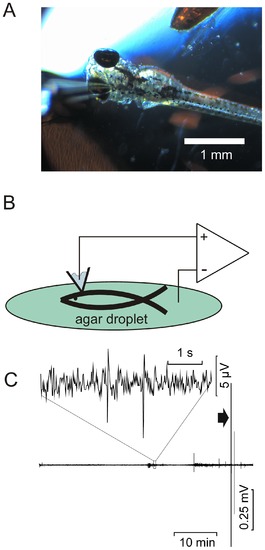Fig. 2
- ID
- ZDB-FIG-141016-47
- Publication
- Zdebik et al., 2013 - Epilepsy in kcnj10 Morphant Zebrafish Assessed with a Novel Method for Long-Term EEG Recordings
- Other Figures
- All Figure Page
- Back to All Figure Page
|
Non-invasive recordings using a patch pipette on the surface of the optic tectum. (A) Photo of the non-invasive EEG ZF recording set-up. To the left is a surface recording pipette, filled with 1 M NaCl. In the upper right is the reference electrode. Both are connected to the amplifier, as shown in the schematic in (B). The mounted fish is positioned on a microscope with which ZF viability can be monitored continuously. (C), long-term EEG recording of a kcnj10a morphant fish initially paralyzed in 20 mM D-tubocurarine. Fish were generally viable for over an hour, but paralysis appeared to wear off after 50 to 60 min. Movement artifacts ensued, associated with electrical activity and visible twitching (arrowhead). A 5 s period indicated by a box in C is represented above the trace in higher resolution. |
| Fish: | |
|---|---|
| Knockdown Reagents: | |
| Observed In: | |
| Stage: | Day 5 |

